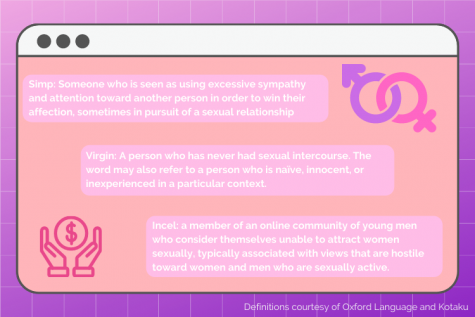Twitch bans sexually-focused insults
The live streaming platform’s recent policy change has been met with skepticism
Science teacher Kyle Jones streams Minecraft on Twitch.
February 7, 2021
On Dec. 9, 2020, the live streaming service Twitch announced a new policy that would ban the offensive use of “sexually focused terms,” such as “simp,” “incel” or “virgin.” The new policy affects both streamers and audience members using the platform’s chatroom function. This ban went into effect on Jan. 22, 2021.

While the policy was made in order to protect individuals of all perceived sexual preferences, Twitch viewers are skeptical about the effectiveness of the policy. Senior and Twitch user Joseph Li believes that over time, the terms in question have taken on a much milder meaning.
“Especially for ‘simp,’ originally, it was, ‘[Simps will] do anything, they’ll do crazy things [for somebody’s attention],’” Li said. “But now, if you’re [just] trying to get a girlfriend, then you’re automatically called [a simp]. [The word] lost its meaning; it’s gone from something extreme, to everybody is one now.”
Junior and Twitch user Collin Ong adds that while these terms could be used in an offensive manner, they are used playfully between understanding individuals in most cases.
“It’ll be like ‘Oh, you chose to heal this person over another person while playing [a game],’” Ong said. “And then [the] chat will spam ‘simp’ and there’s nothing wrong with that — it’s just funny. I feel like as long as it’s not used to insult people, but used to be playful like it is a majority of the time where I see it, it’s fine.”
While Ong and Li stressed that the terms did not warrant this ban, science teacher and Twitch streamer Kyle Jones believes that it is in Twitch’s best interest to pass the recent policy, as Twitch is a big company that makes a large portion of its profits through third party advertisements.
“[Twitch] makes a lot of money, so their public image is important,” Jones said. “They get money from advertisers, so they have to tow that line, just from a company perspective. I would imagine that if a lot of people are being targeted with these terms, Twitch is looking at [and thinking] that this could impact their bottom line, and so they need to make it clear that this is not something that they agree with. I think the community probably wasn’t a huge fan of it. But if you’re Twitch, ultimately, you care about the community, but indirectly. You’re trying to maintain the community, but only insofar as it affects your business model and your bottom line.”
“I think the community probably wasn’t a huge fan of it. But if you’re Twitch, ultimately, you care about the community, but indirectly. You’re trying to maintain the community, but only insofar as it affects your business model and your bottom line.” — Science Teacher and Twitch Streamer Kyle Jones
Li argues, however, that the change in policy could reflect poorly on the already unpopular Twitch moderation team. The moderation team had previously been widely criticized for being biased by members of the community.
“[The offensive use of these terms] was becoming a big issue, but I think it could’ve been dealt with in a better way,” Li said. “It harms perception of Twitch staff even more because I think a lot of people online think the reason [for the ban] is because people were calling Twitch staff that … Twitch [moderation should’ve instead] spread awareness of why it’s bad [to use those terms] rather than just banning them.”
Another potential issue that Ong sees with the policy is that users could bypass the ban simply by using other terms in place of the words specifically referenced by Twitch. For example, members of the community have already started replacing the term “simp” with alternatives, like “shrimp.” By doing this, individuals can still imply the meaning behind the word, but circumvent any potential repercussions for using the word in an inappropriate context.
Similarly, Jones believes that if the intention for Twitch is to stop the targeting of individuals through use of “sexually focused terms,” banning the terms would not provide the desired results. For the future, he hopes that Twitch can implement more effective policies to directly address the issue.
“Ultimately when you’re trying to change behavior, banning a word is usually not the way to do it,” Jones said. “If you don’t want people to be targeting other people for their sexual preferences, [users] have to be more educated about others’ sexual preferences. The ban is not going to fix anything if the behavior or the underlying issues aren’t really addressed, which is a much harder thing to solve. I feel like Twitch is putting a bandaid on a problem that really is not going to get solved by that.”


















